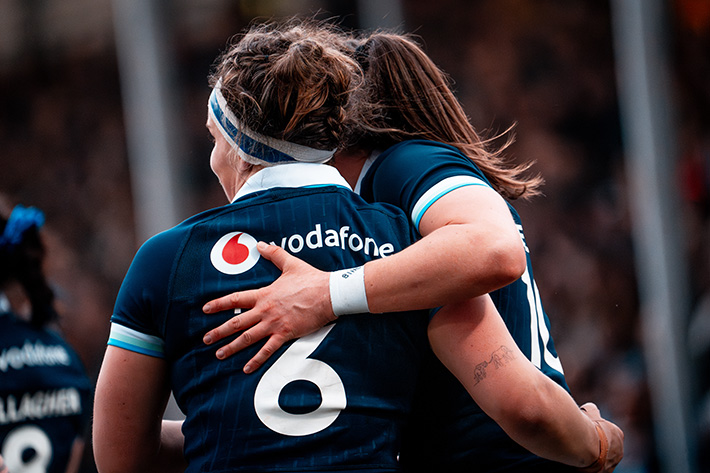Scotland finished their tournament on a high with an incredibly resilient performance against Ireland, with phenomenal defence and four well-taken tries sealing victory. Here are some talking points.
Intense defence repels Ireland
It feels strange to be talking about defence when Scotland got their first W6N try bonus point since the same fixture two years ago, but this was undoubtedly a win built on some committed, sustained, aggressive defence – everything that had been missing in the underwhelming performance against Italy.
Scotland made a phenomenal 219 tackles in the game, with standout statistics belonging to Rachel McLachlan with 28 (which propelled her to being the second highest tackler in the tournament), Elliann Clarke and Jade Konkel on 23 each, Lana Skeldon on 19 and Evie Gallagher on 18.
In fact, 11 Scots were in double figures for tackles. Scotland had to make sure that their defence was solid as Ireland’s possession and territory overall were 62% and 59%, and in the first half, it stood at 72% possession and 69% territory. But Scotland also put Ireland under a lot of pressure when they had ball in hand and made it hard for them to make metres without kicking it away. Perhaps sometimes the line speed looked too aggressive as occasionally when Sarah Bonar flew off the line, a bit of a dogleg or gap was created, but that in itself paid off overall, both forcing a couple of errors as she shut down an attacker and her magnificent interception which provided field position for the second try.
Scotland’s defence was particularly critical in that second quarter, as they were barely out of their own half following Skeldon’s try. McLachlan and co tackled their hearts out and there were some crucial turnovers from the likes of Konkel and Gallagher. It felt that at any point in that period you could have named one of the Scotland team and there would have been at least one example – and maybe more than one – of each player making a brilliant critical tackle, shutting down a half break or stopping a full line break going too far, preventing Ireland from getting too close to the try line or holding the ball up over it as they repelled wave after wave.
And after Ireland’s second try, with Scotland down to 14, the team in green really upped the tempo and momentum to a pretty considerable degree, but Scotland didn’t panic, kept up their intensity and pressure and were able to force Irish mistakes and make life very difficult for them. The resilience they showed in this game will surely inspire them for the crucial games the rest of this year and gave them the opportunity for a completely against the run of play victory.
Scotland put themselves under pressure
Despite this monumental victory, if I’m being picky, I’m not sure Scotland always got their kicking tactics completely right in the game, and this probably contributed to why the territory and possession statistics were so skewed in Irelands favour.
Ireland had a debutant and a 7s player making her first start in their back three, and Scotland did get a bit of joy from kicking to them, purely from the occasional error, which is understandable with first game nerves, but that isn’t a reliable strategy.
A bit too often a longer kick relieved some immediate pressure but ended up in the hands of the always excellent Dannah O’Brien who is so skilled in finding space in the back field and getting into any kind of kicking battle was not a big win. This meant that any territory gain tended to be slight and Scotland were back building their defensive wall, often not much further up the field or back where they started.
Scotland often saw their best success and pressure when they got the ball more towards the tramlines and gave Ireland so much less to work with, but probably didn’t do that as consistently as they should. They also pretty much never kicked to compete, which seems a waste of the athletic talents of the likes of Francesca McGhie, Emma Orr and Rhona Lloyd. Leia Brebner-Holden was excellent, but this slightly more varied kicking game is something that is missing when Caity Mattinson isn’t on the field. However, it was the worst kick from O’Brien and the pace of Brebner-Holden in attack that were major factors in some of Scotland’s attacking success.
Making that limited possession count
Scotland’s response to O’Brien’s missed kick to touch when the 40 minutes were up, was exactly what you wanted to see from the team. Chloe Rollie calmly collected the ball and seized the opportunity, her dynamism sparking phases of pacy and accurate play, with carries that were hard, committed and stretched the defence until there was just enough space for Orr to be able to make a stunning run through what was left of the Irish defence, helped by a smart running line from Gallagher which cleared her space on the inside. It looked like the whole team sprang into life and that they were absolutely going to make this passage count – if it hadn’t been Orr, several other backs were also in at worst a one-on-one outside her.
We saw a similar approach in the lead up to the McLachlan try – Scotland went from side to side, but with real purpose and speed, in a way that just made it near impossible for the Irish to realign their defence, even with an extra player on the field, and once they spotted the space out wide, they got the ball to McLachlan in just enough space to strike (and give us the momentary fear when she celebrated just before crossing the line).
It was a real contrast to the first few minutes when, although Scotland attacked with real pace, they were a little guilty of overplaying and there were a few knock-ons in the tackle, one of which led directly the Amee-Leigh Costigan try. But one of the things Scotland can be really proud of is how quickly and effectively they fixed this and made the attack as effective as it could be, even without much possession with which to work.
Scotland hold their nerve
When Ireland levelled the game at 19-19, with 72 minutes gone and Scotland down to 14 players again, the last few minutes became a battle of who could hold their nerve, and it turned out to be Scotland. The resilience they showed to do this when all the players bar the front row and Lucia Scott had been on the pitch the whole match was phenomenal. It wasn’t faultless, but they made sure they didn’t compound mistakes. The teams swapped line out mistakes – first Scotland, then Ireland, then Scotland again, but the biggest difference was when Scotland did have an error, they put so much pressure on Ireland that Ireland’s mistakes were more consequential.
And then came the final play and the defining moment, with Scotland restored to 15 players. In a move that coach Bryan Easson described immediately post-match as ballsy, Elis Martin and the pack brushed off the two previous shaky set pieces and nailed one right to the back of the line out. The resulting maul was brutal and pushed Ireland back and sucked in multiple defenders, and responsibility switched to the backs. Lisa Thomson, Helen Nelson and Brebner-Holden all recognised the need to move the ball as quickly as possible to the left, and even if the intended pass to Rollie was a little scrappy, Scott and McGhie had also recognised the need to keep their width, Scott calmly gathered the ball and got it into McGhie’s hands for her to finish and have the Hive jumping with unbridled joy.
A brilliant end to a mixed Six Nations
Scotland’s pre-tournament stated aim was to finish third, and ultimately they will be disappointed with fifth, with the Italy game proving their undoing. Like Ireland and Italy above them, they finished with two wins, but the failure to get any points from the Italy game put them on the rung below (one late try would have got them two table points, and taken them fourth and only behind Ireland on points difference). Unlike those two teams, they also failed to put Wales to the sword; Scotland perhaps had to deal with a new coach bounce and had little to analyse in advance, but at the same time, they got to face a Wales team who had only had their head coach in permanently for a week. They had good patches against both France (mostly first half) and England (mostly second half) but we definitely did not see 80-minute games against either team. If Italy can be their only truly sub-par game of the year, then we’ll probably all forget about it quickly, but Scotland cannot have such a lacklustre performance in any of their World Cup games. And to be fair, Italy’s subsequent performances against both France and Wales put the defeat in a slightly less bad light as it became clear that they were really clicking and improving game on game under their new coach.
But the cliché goes that you are only as good as your last game, and Scotland will take so much heart and pride from beating an Ireland team who went into the game as favourites, even without star player Aoife Wafer. Scotland were a little fortunate that Ireland lost a couple of key leaders during the game, but they showed so much passion, resilience and skill to make sure that even with their backs to the wall, they found a way to ultimately win.
They need to keep that feeling and belief fresh in their minds as they go into the World Cup in just a few months’ time.

